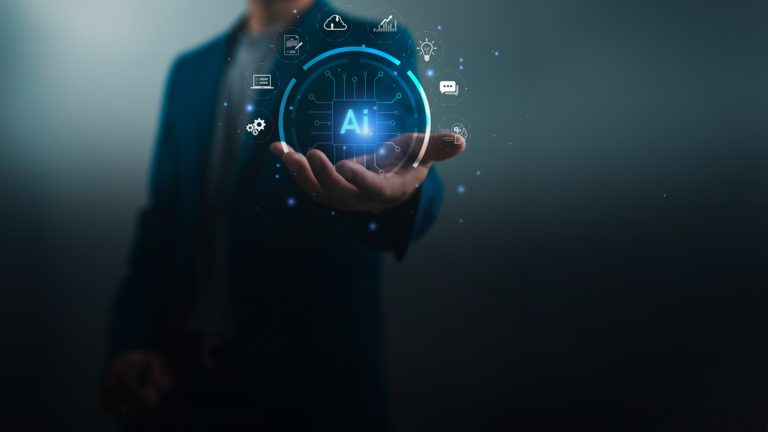How AI Automation is Just What Businesses Need to Future-Proof Their Success

In this technology-driven world, AI automation has become a buzzword in the business world. If you’re wondering what that is, AI automation combines insights from data gathered by AI algorithms to help machines make faster decisions. As a result of this automation, organizations can improve customer experience and improve decision-making.
Artificial Intelligence (AI) is already gaining traction among companies, and its market size is expected to grow by at least 120% year over year. Organizations are already using AI-driven automation in a variety of fields. So, for aspirants, AI automation can be a great way to break into the AI and automation space. This article aims to discuss how AI automation can help businesses by providing an overview of its various benefits and use cases.
AI Automation Use Cases
The combination of AI and automation has the potential to transform the way businesses work, across diverse industries. Harnessing AI capabilities will allow organizations to reduce time spent on mundane tasks, improve accuracy, and increase efficiency. Let’s see how it could work in different industries.
Manufacturing
AI automation can play an integral role in helping the manufacturing sector increase its economic gains. According to PwC, by 2030, 45% of these benefits will come from product enhancements that stimulate consumer demand. Additionally, manufacturers can leverage AI-backed analytics to reduce unplanned downtime, improve efficiency and quality, and enhance workplace safety. Given here are some of the ways in which AI automation can benefit the manufacturing industry
1. Enhanced Quality
Firstly, you need to find the right people with the expertise to get the most out of AI technologies and automation. Cobots, for example, are collaborative robots that will assist humans in completing intricate tasks. However, you still require somebody to program them so that complex jobs can be performed efficiently.
2. Enhanced Production
AI can help streamline the production process and make it more efficient. AI-based solutions are capable of automating mundane tasks, such as inventory management and material transport, freeing people up for more complex tasks. AI-powered robots can move autonomously around factories and warehouses to fulfill orders quickly and accurately.
such as inventory management and material transport, freeing people up for more complex tasks. AI-powered robots can move autonomously around factories and warehouses to fulfill orders quickly and accurately.
3. Predictive Maintenance
Imagine preempting a problem before it becomes a bigger issue. AI algorithms can detect potential issues in the production line, allowing manufacturers to take corrective action before any significant damage is done. AI-backed analytics enable factory owners to track and monitor their machines in real-time. This, in turn, will help reduce downtime and raise productivity.
Real Estate
AI automation is becoming increasingly popular in the real estate industry. It automates mundane tasks such as listing and marketing, allowing agents to focus on more critical aspects of the job. AI-powered chatbots and virtual assistants can be used for customer service, providing instant responses to frequently asked questions. AI-driven analytics can also be leveraged to provide insights into consumer behavior and market trends.
1. Automated Lead Generation and Management
AI algorithms can automatically collect information about potential customers from different sources, such as social media platforms or websites. This will enable agents to quickly identify qualified leads based on certain predefined criteria, and send out personalized messages along with details of relevant properties that they may be interested in. AI can also help real estate agents determine which leads have the potential to convert into sales.
2. Marketing and Advertising
AI is revolutionizing how real estate agents approach marketing and advertising. AI-driven solutions enable them to target potential customers with more personalized messages, helping increase their chances of generating qualified leads. AI-backed chatbots help improve customer service, too, by providing instant responses to questions. AI algorithms can also extract relevant data from past customer conversations, enabling agents to gain valuable insights into customer behavior and market trends.
3. Smart Home Search Portals
AI-powered solutions are also making it easier for agents to find the perfect house or property for their clients. AI algorithms can be leveraged to analyze customer preferences and generate a list of properties that match their criteria. What’s more, such AI-enabled search portals can provide customers with relevant information about neighborhood amenities, schools, safety ratings, etc.
Retail
AI automation is making it easier for retailers to streamline their operations and provide better customer service. AI-powered solutions are capable of automating tasks such as inventory management and product categorization. Retail companies can also use AI algorithms to analyze customer behavior and provide insights into market trends.
1. Inventory Management
AI technologies enable retailers to keep track of inventory in real-time, allowing them to identify stock levels and fulfill orders promptly. AI-enabled robots can move autonomously around warehouses to pick items for orders quickly and accurately.
2. Personalization and AI-Powered Chatbots
AI algorithms can also help retailers provide personalized shopping experiences. For example, AI-backed chatbots can help answer customers’ questions instantly, providing them with the information they need quickly and effectively. Moreover, AI-driven solutions enable retailers to target potential customers with offers and promotions, helping increase their chances of generating qualified leads.
Healthcare
 AI automation is making it easier for healthcare professionals to provide better patient care. Automating tasks such as data entry frees doctors and nurses to focus on patients. AI-driven analytics can analyze large data sets and provide insights into patient health trends, enabling healthcare professionals to make informed decisions quickly. Image recognition with the help of AI algorithms can help diagnose patients faster and more accurately.
AI automation is making it easier for healthcare professionals to provide better patient care. Automating tasks such as data entry frees doctors and nurses to focus on patients. AI-driven analytics can analyze large data sets and provide insights into patient health trends, enabling healthcare professionals to make informed decisions quickly. Image recognition with the help of AI algorithms can help diagnose patients faster and more accurately.
1. Robotics
AI-enabled robots can perform complex surgical procedures with precision and accuracy, reducing risks associated with surgery and improving outcomes. AI-powered robots also automate drug delivery, so that patients get their medication quickly and efficiently.
2. Brain-Computer Interfaces
Currently, AI-powered brain-computer interfaces are being developed to help doctors monitor the neurological activity of their patients. AI algorithms can analyze MRI scans, for example, to detect abnormalities in the brain, enabling healthcare professionals to identify potential health issues quickly. And that’s not all: AI-enabled systems can also help with prosthetics control, which will help amputees regain mobility and lead more independent lives.
Step Into the Future with Emeritus
We’ve only scratched the surface when it comes to exploring the potential of AI automation across industries. As AI technologies advance, we will continue to see new applications that have the potential to improve our lives even more. And if you want to get a headstart in this field and future-proof your career, then Emeritus’ artificial intelligence and machine learning courses are just what you need.





